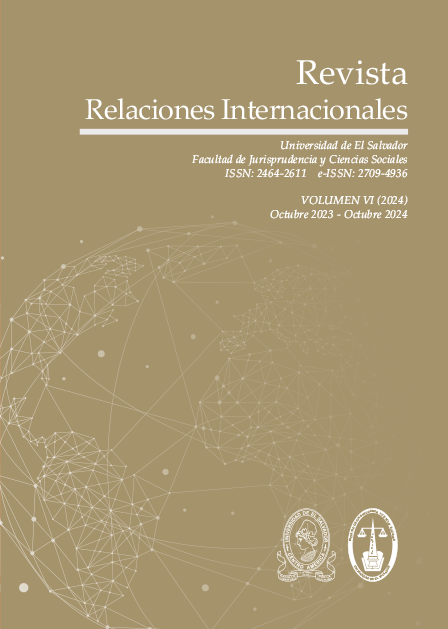Digital International Interaction: Towards a New Theory on International Relations
Keywords:
new diplomacy, engineering diplomacy, international digital interaction theory, artificial intelligence, technologyAbstract
This paper discusses the concept of new diplomacy and its relationship to smart power, arguing that soft power is just as important as hard power in international politics. The paper explores the emergence of geotechnology as a new variable in international relations, referring to the competition between countries to control and gain influence in areas of technological importance. Additionally, the paper highlights a theoretical gap in the study of international relations regarding cyberspace and the new realities imposed by technology. It discusses the role of technology in shaping a new framework for international relations, leading to increased complexity, interconnection, and interdependence. The paper argues that states must adapt to the logic of performance in the international environment and that technological progress has led to radical changes in the elements and balances of power. The researcher aims to present a new theory in international relations that analyzes the influence of digital technology and social media on shaping international relations and rearranging actors and factors. This theory suggests that these technological advancements have significant impacts on international policy directions, as well as political and economic decision-making.
Downloads
References
“Digital Diplomacy”. The Diplomatic Service of the European Union, access June 29th, 2023, https://www.eeas.europa.eu/eeas/digital-diplomacy_en
“DiploFoundation - Where diplomacy meets technology”. DiploFoundation, access September 12th, 2023, https://www.diplomacy.edu/
“What is diplomacy?”. The Cyber Diplomacy Toolbox, access August 2nd, 2023, https://www.cyber-diplomacy-toolbox.com/Diplomacy.html
Abu Abah, Saeed. Diplomacy: Its History, Institutions, Types, Laws. Jordan: Dar Al-Shaimaa for Publishing and Distribution, 2009.
Adesina, Olubukola S. “Africa and the future of digital diplomacy”. Brookings, (2022). https://www.brookings.edu/articles/africa-and-the-future-of-digital-diplomacy/
Adesina, Olubukola S. “Foreign policy in an era of digital diplomacy”. Cogent Social Sciences, vol. 3 (2017): 1-13. https://doi.org/10.1080/23311886.2017.1297175
Al-Sham, Ali Hussein. Diplomacy, its origins, development, and rules in international immunities and privileges. Beirut: Science Research for investigation, printing, publishing and distribution, 2007.
Arsenault, Amelia C. and Sarah E. Kreps. “AI and International Politics”. In The Oxford Handbook of AI Governance, edited by Justin B. Bullock et al. Oxford: Oxford University Press, 2022.
Biermann, Frank et al. “The Fragmentation of Global Governance Architectures: A Framework for Analysis”. Global Environmental Politics, vol. 9 (2009): 14-40. https://doi.org/10.1162/glep.2009.9.4.14
Biermann, Frank et al. Earth System Governance: People, Places and the Planet. Science and Implementation Plan of the Earth System Governance Project. Bonn: The Earth System Governance Project, 2009.
Bostrom, Nick. Superintelligence: Paths, Dangers, Strategies. Oxford: Oxford University Press, 2014.
Bremer, Ian. Us vs. Them: The Failure of Globalism. New York: Portfolio, 2018.
Buch, Amanda M., David M. Eagleman and Logan Grosenick. “Engineering Diplomacy: How AI and Human Augmentation Could Remake the Art of Foreign Relations”. Science & Diplomacy, (2022). https://doi.org/10.1126/scidip.ade6798
Butros-Ghali, Butros. An agenda for peace: preventive diplomacy, peacemaking and peace-keeping: report of the Secretary-General pursuant to the statement adopted by the Summit Meeting of the Security Council on 31 January 1992. New York: United Nations, 1992.
Choucri, Nazli. Cyberpolitics in International Relations. Massachusetts: The MIT Press, 2018.
Drinkwater, Derek. Sir Harold Nicolson and International Relations: The Practitioner as Theorist. Oxford: Oxford University Press, 2005.
El Amine, Benaicha Mohamed. “Digital international interaction: towards a new theory in international relations”. ElWassat (blog), September 10th, 2023. https://shorturl.at/bnr28
El Amine, Benaicha Mohamed. Algerian diplomacy in the African coast between continuity and change. Saarbrücken, Noor Publishing, 2017.
Gil-Garcia, J. Ramon, Sharon S. Dawes and Theresa A. Pardo. “Digital government and public management research: finding the crossroads”. Public Management Review, vol. 20 (2018): 633-646. https://doi.org/10.1080/14719037.2017.1327181
Hadid, Hassan Muhammad Salah. “Diplomacy in Islamic Sharia”. Takit Journal of Legal and Political Sciences, (1998): 17-30.
Hagendorff, Thilo. “The Ethics of AI Ethics: An Evaluation of Guidelines”. Minds and Machines, vol. 30 (2020): 99-120. https://doi.org/10.1007/s11023-020-09517-8
Krisnata, Reece. “Artificial Intelligence and International Affairs”. Australian Outlook – Australian Institute of International Affairs, (2023). https://www.internationalaffairs.org.au/australianoutlook/artificial-intelligence-and-international-affairs/
Mallik, Amitav. Role of Technology in International Affairs. New Delhi, Pentagon Press, 2016.
Mamchii, Oleksandra. “The Significance of Cyber Diplomacy in the 21st Century”. Best Diplomats (blog), February 21st, 2023. https://bestdiplomats.org/cyber-diplomacy/
Manantan, Mark B. “Defining Cyber Diplomacy”. Australian Outlook – Australian Institute of International Affairs, (2021). https://www.internationalaffairs.org.au/australianoutlook/defining-cyber-diplomacy/
Meshkati, Najmedin. “Engineering Diplomacy: An Underutilized Tool in Foreign Policy”. Science & Diplomacy, vol. 1 no. 2 (2012): 50-62. https://www.sciencediplomacy.org/perspective/2012/engineering-diplomacy
Satow, Ernest. A Guide to Diplomatic Practice. Cambridge: Cambridge University Press, 1932.
Saxena, Parul. “AI Across Borders: AI in Diplomacy, International Relations, and Humanitarian Efforts”. IndiaAI, April 15th, 2021. https://indiaai.gov.in/article/ai-across-borders-ai-in-diplomacy-international-relations-and-humanitarian-efforts
Schwartz, Tony and Donald Trump. Trump: The Art of the Deal. New York: Random House Publishing Group, 2009.
Shalabi, Amin. Modern Diplomacy. El Cairo: Aalam Al-Kutob, 1997.
Sharma, Nandika. Digital Diplomacy: The Evolution of a New Era in Diplomacy. New Delhi: Research and Information System for Developing Countries, 2023. https://ris.org.in/sites/default/files/2023-01/interns/topics/Nandika-Sharma.pdf
Sharp, Paul. “For Diplomacy: Representation and the Study of International Relations”. International Studies Review, vol. 1, no. 1 (1999): 33-57.
Swiss Federal Department of Foreign Affairs, ABC of Diplomacy. Bern: Cavelti AG, Gossau, 2008.
Szkarłat, Monika and Katarzyna Mojska. New Technologies as a Factor of International Relations. Cambridge, Cambdrige Scholars Publishing, 2016.
Wolff, Josephine. “How Is Technology Changing the World, and How Should the World Change Technology?”. Global Perspectives, vol. 2 (2021): 15-25. https://doi.org/10.1525/gp.2021.27353
Zhu, Qichao and Kun Long. “How will artificial intelligence impact Sino–US relations?”. China International Strategy Review, vol. 1 (2019): 139-151. https://doi.org/10.1007/s42533-019-00008-9
Published
Issue
Section
License
Copyright (c) 2024 Revista Relaciones Internacionales

This work is licensed under a Creative Commons Attribution-NonCommercial 4.0 International License.
The authors transfer the copyright rights in favor of the Faculty of Jurisprudence and Social Sciences of the University of El Salvador (through Aequus Editorial) to include their writing in Revista Relaciones Internacionales.








